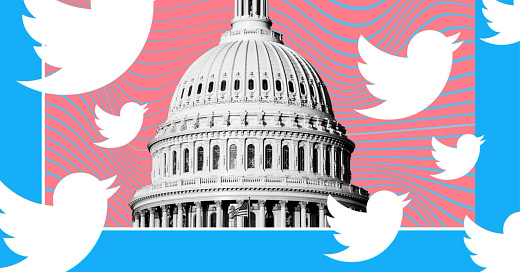Why can't Washington quit Twitter?
Plus, battles over political journalism, the uncertain fate of election betting in the U.S., and stuff I'm reading
Why are you getting this email? At some point you subscribed to a newsletter from me, Nancy Scola, called Slow Build and focused on tech and society.
I hit pause on that newsletter in February to focus on other projects, but am reviving the list for the occasional update on my work. That’s not exactly what you signed up for, so if you’d like to unsubscribe, no hard feelings. That said, glad to have you here.
With that, I have a few new stories out that I thought might be of interest…
Why Can’t Washington Quit Twitter?
You might have heard that Elon Musk-era Twitter is going through some things. I’ve been on Twitter since 2006 and worked in Washington for quite some time, but in reporting out a piece on the platform’s role in American politics and policy for POLITICO Magazine, I was surprised to learn how enmeshed it’s become in the way the capital works — from Capitol Hill to K Street to the Department of Defense.
So if Musk does end up destroying Twitter (a decent possibility, I think, but by no means a sure thing) it’ll be a fairly wrenching experience for Washington.
That story, “Why Washington Can’t Quit Twitter,” for POLITICO Magazine, is here.
The Good Information Wars
Courier Newsroom was launched in 2019 as a project of the progressive advocacy group ACRONYM, and has since spun out as a standalone network of left-leaning local news sites stretching from Arizona to Michigan to Virginia.
You might notice that those states are all political hotspots. Journalistic watchdogs have picked up on that, too. Courier and its leader, Tara McGowan, are at the center of a debate over whether it’s a propaganda shop masquerading as journalism or a modern news publisher admirably explicit about its mission and tactics. I profile both Courier and McGowan in the November issue of Wired Magazine.
That story, “The Election-Swinging, Facebook-Fueled, Get-Out-the-Vote Machine, for Wired Magazine, is here.
If you’re interested in the topic, I recommend as a companion piece a recent post from Popular Information’s Judd Legum on how and why, as he puts it, “political media is broken.” Part of the argument is that reporters over-rely on polling that isn’t great at capturing the state of elections in the U.S., which gets at the subject of the last story I wanted to bring to you…
The Battle over Political Betting
Big-name Silicon Valley investors like Sam Altman and Ron Conway have of late gotten behind a push from a startup called Kalshi to get federal regulators to go where they’ve been reluctant to go: signing-off on trading election futures the same way people trade futures on corn or oil.1 For The Information, I dug into Kalshi’s attempt to get the U.S. Commodity Futures Trading Commission to approve the trading of congressional-control contracts before the recent mid-term elections. (If you’d like to read it but aren’t a subscriber to The Information, give me a shout.)
Kalshi came up short, but it’s unlikely the debate will end there. Prediction markets have real fans in the U.S., including those who see them as a significant improvement on traditional political polling — “financial incentives for truthful revelations” is how the economist Adam Ozimek describes the dynamic. Former Treasury Secretary Larry Summers told me that when it comes to prediction markets, “the world is a better place with them than without them.”
That story, “Could Gambling on Elections Be ‘Bigger Than Sports Betting’? A Trading Startup Shoots Its Shot,” for The Information, is here.
Think I missed something? Got story ideas or a hot tip? Let me know.
STUFF I’M READING
Writing for New York, Shawn McCreesh profiles Mathias Döpfner, the big-personality CEO of the German publishing giant Axel Springer who last fall engineered a billion-dollar deal to buy POLITICO. It’s an inside look at how someone suddenly with a lot of power in American journalism is thinking about what McCreesh calls “the possibilities of digital transformation.”
TargetSmart’s Tom Bonier talks about why he always doubted the “red wave.” Short answer: abortion.
The group Middle Seat Consulting writes about how it helped turn John Fetterman into a United States senator by focusing on the “witty and gritty.”
There are a lot of layers to whether the loosey-goosey American regulatory environment for crypto helped contribute to last week’s FTX collapse, and much left to be said; here Matt Stoller looks at the role of SEC chairman Gary Gensler.
Wired’s Steve Levy goes deep inside Facebook’s — okay, okay, Meta’s — “Oversight Board” and finds it less the joke its critics guaranteed it would be.
Finally, pour one out for Protocol. Journalism is a tough business, and the good folks there put in a heroic effort trying to make it work.
Thanks, as always and ever, for reading.
One random historical tidbit I came across while reporting this story: since 1958 the trading of onion futures has been banned in the United States. What a country.







